Key takeaways:
- Defining band culture values, such as open communication and mutual respect, strengthens bonds and resolves conflicts.
- Building trust through vulnerability and acknowledgment of contributions fosters a supportive and creative environment.
- Encouraging open communication and regular feedback sessions enhances collaboration and everyone’s voice is valued, igniting innovation.
- Team-building activities deepen connections among members, promoting unity and inspiring creativity in musical endeavors.
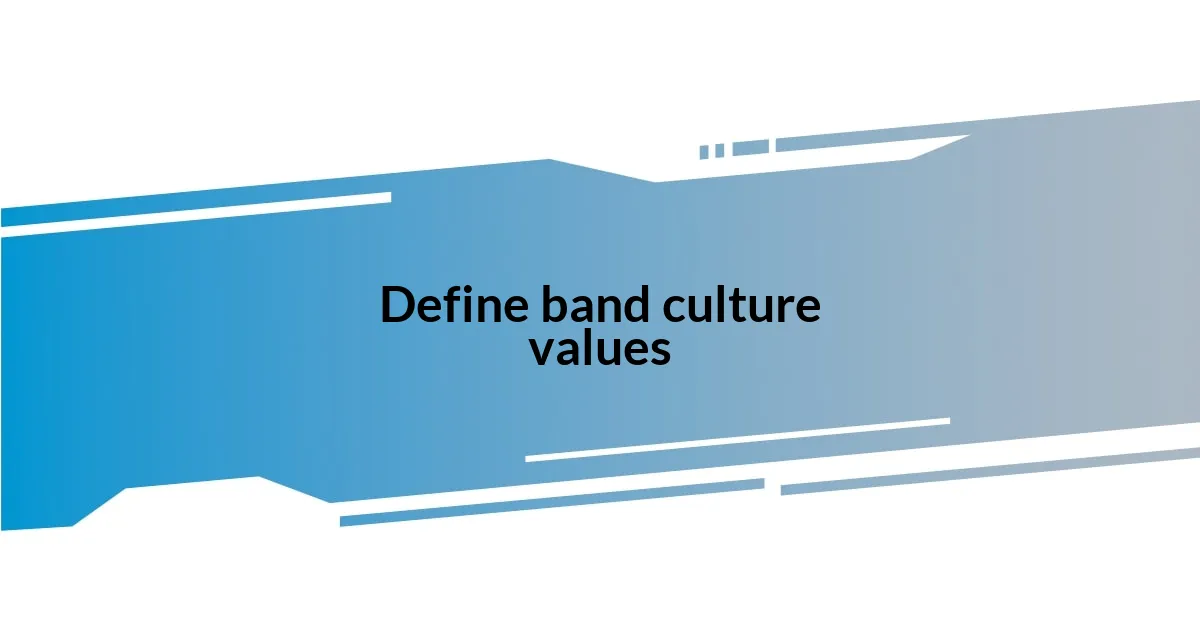
Define band culture values
When I think about band culture values, I often reflect on how crucial they are in shaping the overall vibe of the group. These values can manifest in many ways, from a commitment to collaboration to a genuine respect for each member’s individuality. Have you ever noticed how the most successful bands seem to flow seamlessly together? That’s no accident; it comes from having clear values that everyone respects.
One of the most eye-opening experiences I had was during a band rehearsal where we faced a disagreement over song direction. It was only when we revisited our core values—open communication and mutual respect—that we were able to turn that tension into a creative breakthrough. This experience reinforced my belief that a strong set of shared values not only resolves conflicts but also strengthens bonds between bandmates.
Ultimately, defining these values can feel like setting the groundwork for a masterpiece. It might surprise you how a simple chat about what each member values can unfold deeper connections and shared goals. Isn’t it fascinating how such a seemingly small step can lead to such profound results?
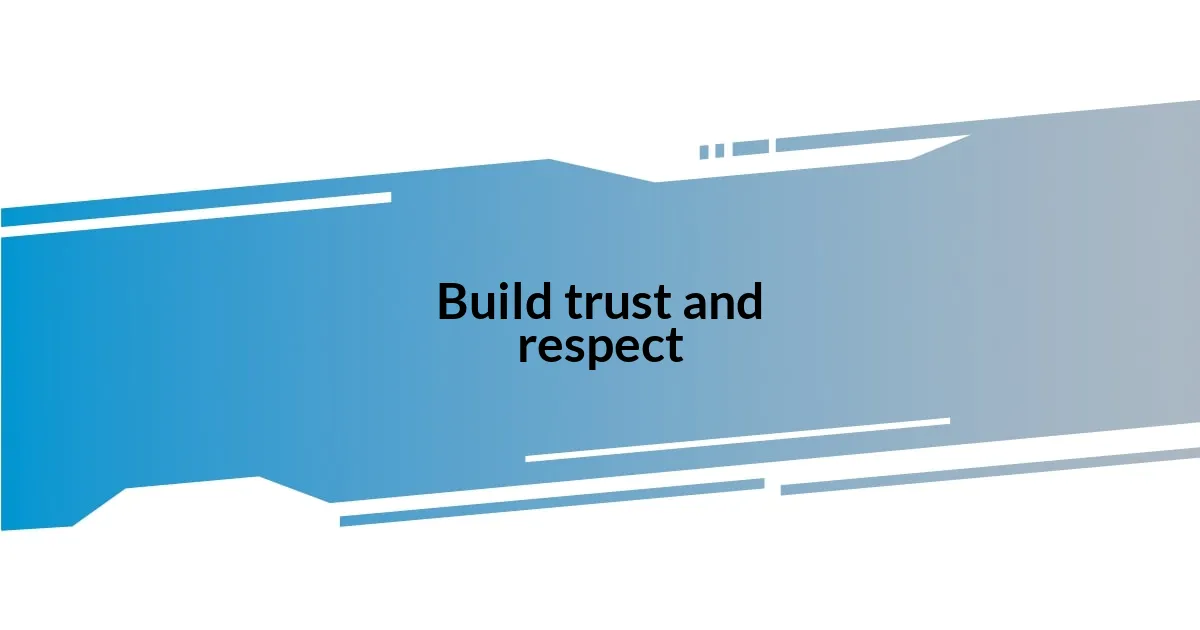
Build trust and respect
Building trust and respect within a band is not just essential; it’s transformative. I remember a time when a fellow musician felt left out during our jam sessions. Instead of brushing it off, we had an honest conversation. By openly discussing our feelings and encouraging everyone to voice their thoughts, we nurtured a sense of safety that allowed creativity to flourish. That experience taught me that fostering an environment where everyone feels valued is vital for trust.
Respect often reflects how we treat each other’s time and contributions. I’ve found that acknowledging each member’s input, regardless of how small it might seem, builds a strong foundation. For instance, during songwriting sessions, I make it a point to highlight the unique touch each person brings. This recognition not only boosts morale but also creates an atmosphere where members are eager to contribute, knowing their efforts are appreciated.
Additionally, vulnerability can significantly enhance trust. I once shared my fear of singing a particular part during a performance, and to my surprise, others echoed those feelings. This moment of honesty bonded us closer together; it was a reminder that we’re all on the same journey. Trust grows when each member knows they can share their insecurities without judgment, and that shared vulnerability fosters a profound sense of respect among one another.
| Trust Building Actions | Effects on Band Culture |
|---|---|
| Open Communication | Encourages honest dialogue and reduces misunderstandings. |
| Acknowledgment of Contributions | Boosts morale and reinforces each member’s value. |
| Sharing Vulnerabilities | Deepens connections and fosters a supportive environment. |
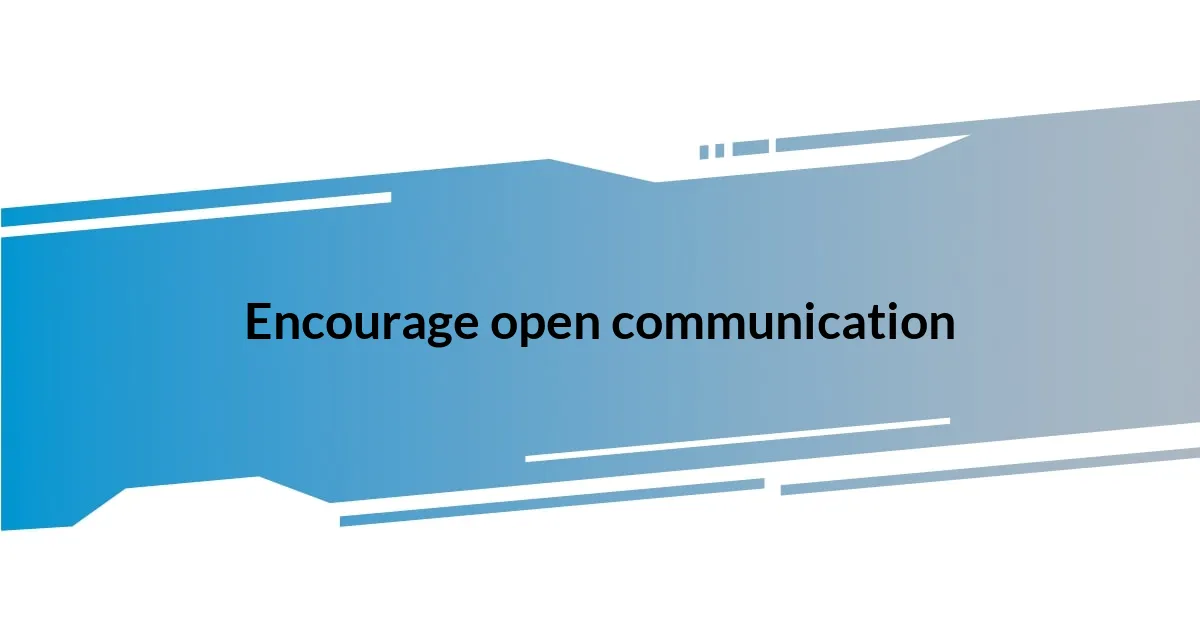
Encourage open communication
Creating an environment for open communication in a band goes beyond just having quick discussions before or after rehearsals; it’s about fostering a culture where everyone feels safe to express their thoughts. I vividly recall a moment when I suggested a different arrangement of a song. Instead of just floating my idea and waiting for feedback, I initiated a roundtable discussion. This led to an engaging dialogue where everyone chimed in, and we ultimately developed something even better than I initially envisioned. It was in this moment that I realized how much more creative and fulfilled we feel when everyone’s voice is valued and heard.
- Regular check-ins: Set aside time during rehearsals to discuss any concerns or ideas, ensuring everyone gets a chance to speak up.
- Create a judgment-free zone: Encourage honesty by making it clear that all opinions are welcome and respected, regardless of how unconventional they may seem.
- Encourage feedback: Make it a practice to ask for input on not just music but also the dynamics and processes within the band, reinforcing that every member’s experience matters.
One simple yet powerful strategy I’ve employed is the “open-door” policy. This means that bandmates can approach each other at any time to share their thoughts—whether they’re feeling inspired or need to address a concern. I fondly remember a time when a bandmate approached me with hesitation, unsure about how I’d react to their critique of our song choices. When I welcomed their feedback enthusiastically, it not only eased their worries but also sparked a deeper conversation about our artistic direction. This kind of open dialogue creates a synergy that propels our creativity and strengthens our bond.
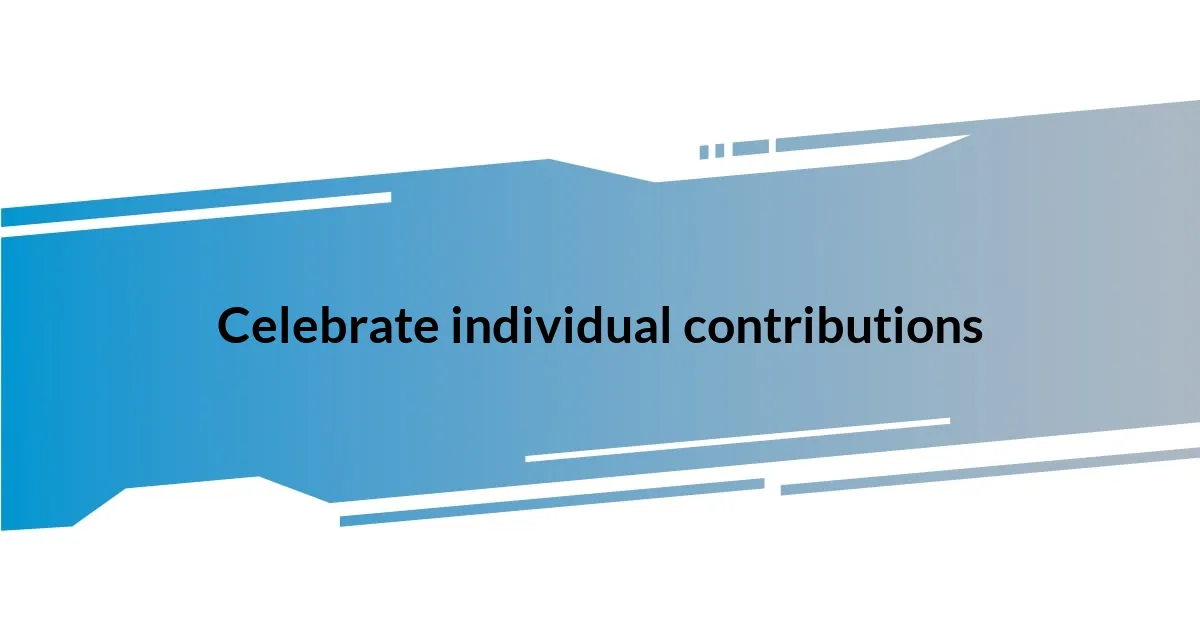
Celebrate individual contributions
Celebrating individual contributions in a band is vital for fostering a sense of belonging and pride. I’ll never forget the time I acknowledged a bandmate’s unique guitar riff during a rehearsal. Their face lit up with joy, a clear reflection of how meaningful that simple recognition was for them. It made me realize how powerful it is to spotlight the strengths that each person brings; it transforms the atmosphere into one of mutual encouragement.
When I make it a habit to celebrate individual achievements, I see a noticeable shift in our group dynamic. I recall a moment when one of our singers hit a particularly challenging note perfectly during a live show. Instead of just moving on, I called out that accomplishment in front of our audience. The applause from our fans and the smile on their face reinforced how the simple act of recognition can fuel confidence and drive creativity. Can you imagine how this kind of positive reinforcement can reshape the way we collaborate? I’ve found it cultivates an eagerness among us to share our ideas, knowing they will be valued.
Personal contributions should never be overlooked; they weave the tapestry of our sound. I’ve learned that even the smallest gestures matter, like spotlighting a different drummer’s fills or a backing vocalist’s harmonies. It builds a bridge of appreciation that connects us. Sharing these moments during our meetings has helped us celebrate each unique skill, allowing everyone to shine together as part of a collective effort. When we see ourselves not just as a band, but as a group of individual talents, the energy shifts dramatically. Doesn’t that inspire you to appreciate your bandmates even more? I know it does for me.
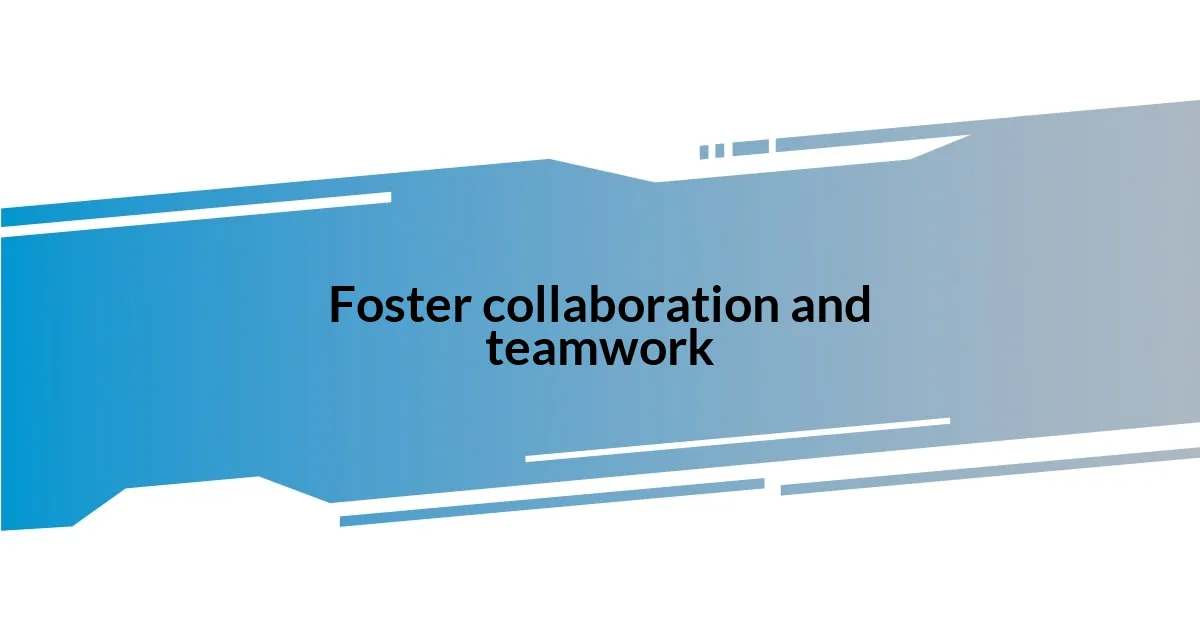
Foster collaboration and teamwork
To truly foster collaboration and teamwork, I like to encourage brainstorming sessions that invite every member to share their ideas. I remember a time when we were stuck on the arrangement of a new song, and instead of trying to figure it out alone, I suggested an informal jam where we all brought our ideas to the table. The energy was electric, and what emerged was not just a new song, but a sense of unity as everyone contributed their thoughts and creativity. It’s moments like these that remind me how collaboration can ignite inspiration, leading to unexpected and exciting outcomes.
One technique that has proven effective is assigning rotating roles during rehearsals. For instance, I’ve let different bandmates take the lead on various songs, allowing them to shape the arrangement or suggest how to approach the performance. I recall one rehearsal where our bassist stepped up to direct. At first, there were some nerves, but the transformation was remarkable. By stepping outside our usual roles, we began appreciating each other’s perspectives and talents, fostering a deeper sense of teamwork. Doesn’t it feel rewarding to watch your bandmates grow and shine in ways you hadn’t imagined before?
Team-building exercises outside of music also play a key role in enhancing our collaboration. I’ve organized fun activities, from game nights to group hikes. I distinctly remember one such experience where we tackled a ropes course together. Each of us faced our own fears, and the shared challenge brought us closer. Those laughs and moments of vulnerability translate back into our musical endeavors, making it easier to lean on one another during rehearsals. I’ve come to realize that strong teamwork is built on trust and understanding— qualities that flourish both on and off the stage.
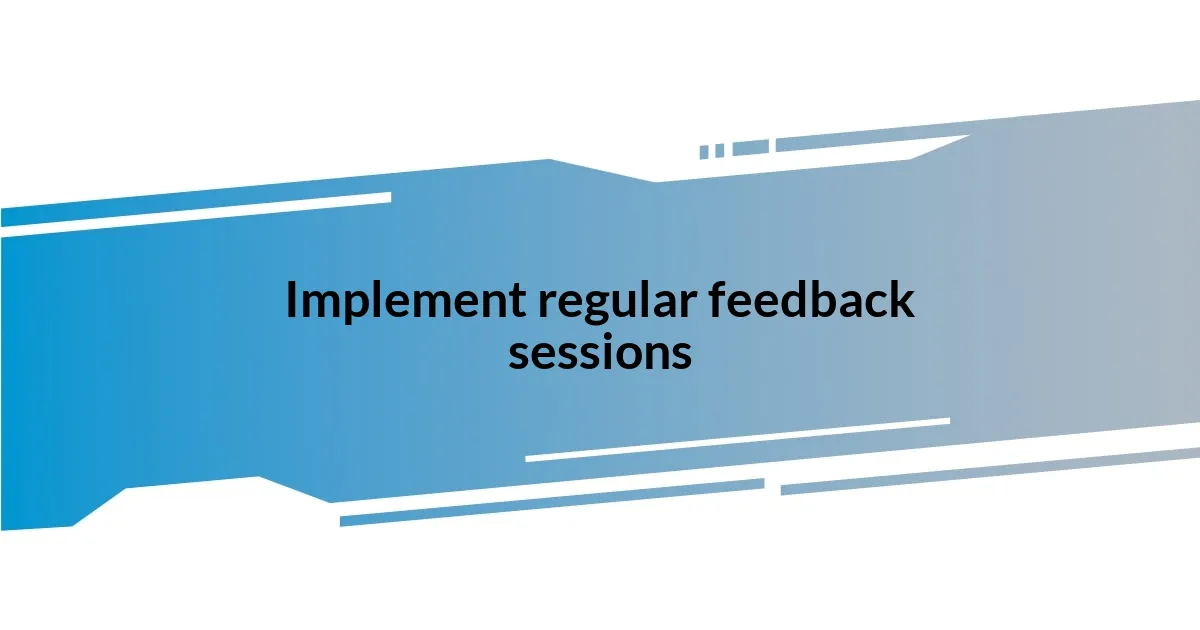
Implement regular feedback sessions
Implementing regular feedback sessions has been a game changer for my band. I remember the first time we set aside time specifically for feedback after rehearsals; it was a bit awkward at first. But to my surprise, what started as a few hesitant comments quickly blossomed into an open dialogue where everyone felt comfortable sharing their thoughts and perspectives. It dawned on me how crucial it is to create a safe space for this kind of communication.
During one feedback session, a bandmate expressed how they felt our sound had started to lose some of its original spark. Instead of getting defensive, we took a moment to discuss what that meant for all of us. This not only led to some constructive changes in our arrangements, but it also deepened our understanding of each other’s artistic visions. I often wonder: how many bands miss out on this depth of connection simply because they avoid uncomfortable conversations? From my experience, fostering that openness can ignite a renewed passion for what we create together.
I’ve found it helpful to incorporate a rotation system where everyone has a chance to lead the feedback discussions. This brings in diverse perspectives and reduces the intimidation some might feel in a traditional hierarchical structure. On one occasion, I watched as our shy keyboardist took charge of a feedback session. The insights they shared were thought-provoking and came from an unexpected place—reminding me that everyone has valuable input to contribute. Isn’t it incredible how giving each person a voice can strengthen the unity in a band? Each session reveals more than just areas of improvement; they also uncover the individual strengths that collectively make our music special.
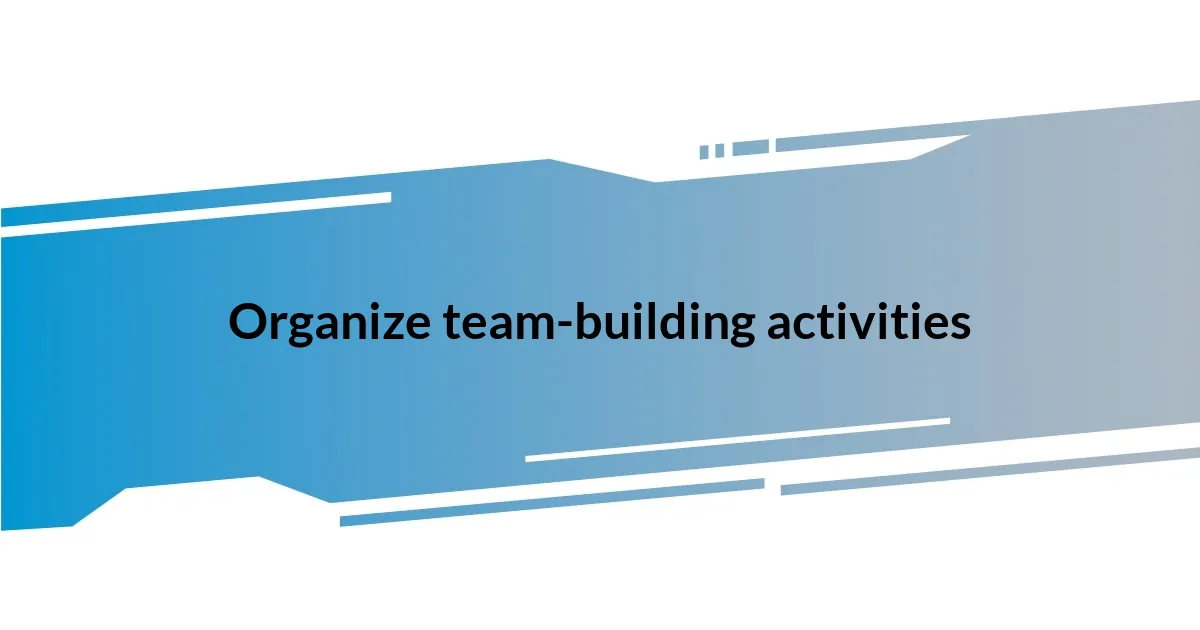
Organize team-building activities
Organizing team-building activities has been an exciting and transformative experience for my band. One time, we set aside a weekend for a camping trip. It was a chance for us to unplug from the pressures of music and simply enjoy each other’s company. Sitting around the campfire, sharing stories and jokes, I noticed how relaxed everyone was—just being ourselves without instruments or a setlist. Those moments fostered deeper connections that eventually spilled over into our music, solidifying not just our friendships but our collaborative spirit too.
I also believe in the power of friendly competition. For example, we once arranged a friendly game of soccer followed by a BBQ. I wasn’t sure how it would go, but the enthusiasm was infectious. Watching a usually shy guitarist go for a goal made me realize the importance of pushing boundaries—whether in sports or music. Isn’t it fascinating how challenging each other in different arenas can bring out strengths we didn’t know existed? That day, we cheered for each other, and that energy became fuel for our next rehearsal, where everyone was more willing to take risks musically.
Incorporating quirky or theme-based activities can also break the mold. For instance, we held a “throwback jam” where everyone had to bring a song from their childhood. It was a delightful mix of nostalgia and laughter as we attempted to play songs we hadn’t touched in years. I remember how our drummer’s face lit up when we played a classic ’90s pop hit. It’s moments like these that remind me how creativity flourishes in an environment where everyone feels free to express themselves. Don’t you think it’s remarkable how a little fun can create a bond that resonates in our music long after the activities end?